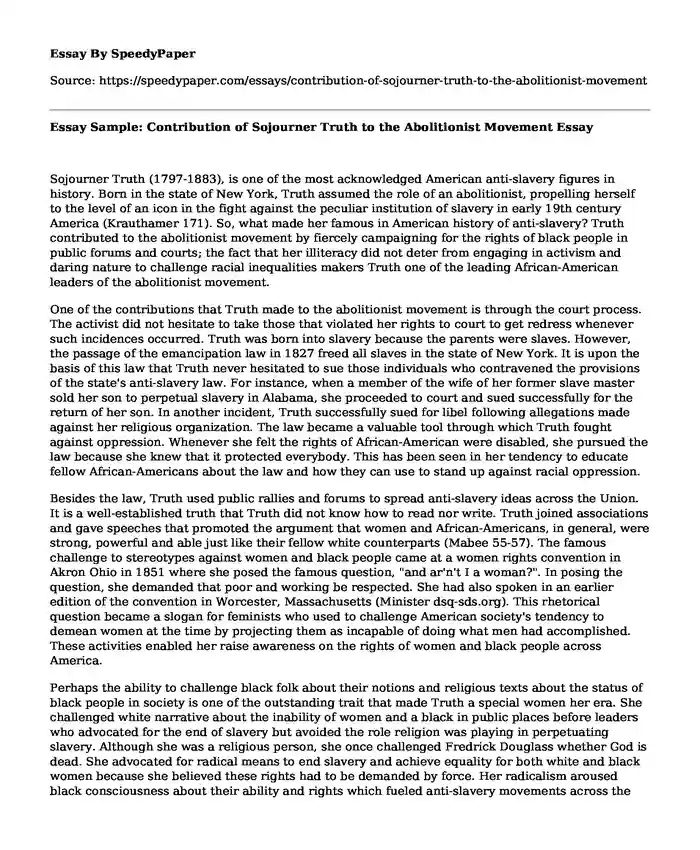
| Type of paper: | Essay |
| Categories: | Women Discrimination United States Slavery |
| Pages: | 3 |
| Wordcount: | 762 words |
Sojourner Truth (1797-1883), is one of the most acknowledged American anti-slavery figures in history. Born in the state of New York, Truth assumed the role of an abolitionist, propelling herself to the level of an icon in the fight against the peculiar institution of slavery in early 19th century America (Krauthamer 171). So, what made her famous in American history of anti-slavery? Truth contributed to the abolitionist movement by fiercely campaigning for the rights of black people in public forums and courts; the fact that her illiteracy did not deter from engaging in activism and daring nature to challenge racial inequalities makers Truth one of the leading African-American leaders of the abolitionist movement.
One of the contributions that Truth made to the abolitionist movement is through the court process. The activist did not hesitate to take those that violated her rights to court to get redress whenever such incidences occurred. Truth was born into slavery because the parents were slaves. However, the passage of the emancipation law in 1827 freed all slaves in the state of New York. It is upon the basis of this law that Truth never hesitated to sue those individuals who contravened the provisions of the state's anti-slavery law. For instance, when a member of the wife of her former slave master sold her son to perpetual slavery in Alabama, she proceeded to court and sued successfully for the return of her son. In another incident, Truth successfully sued for libel following allegations made against her religious organization. The law became a valuable tool through which Truth fought against oppression. Whenever she felt the rights of African-American were disabled, she pursued the law because she knew that it protected everybody. This has been seen in her tendency to educate fellow African-Americans about the law and how they can use to stand up against racial oppression.
Besides the law, Truth used public rallies and forums to spread anti-slavery ideas across the Union. It is a well-established truth that Truth did not know how to read nor write. Truth joined associations and gave speeches that promoted the argument that women and African-Americans, in general, were strong, powerful and able just like their fellow white counterparts (Mabee 55-57). The famous challenge to stereotypes against women and black people came at a women rights convention in Akron Ohio in 1851 where she posed the famous question, "and ar'n't I a woman?". In posing the question, she demanded that poor and working be respected. She had also spoken in an earlier edition of the convention in Worcester, Massachusetts (Minister dsq-sds.org). This rhetorical question became a slogan for feminists who used to challenge American society's tendency to demean women at the time by projecting them as incapable of doing what men had accomplished. These activities enabled her raise awareness on the rights of women and black people across America.
Perhaps the ability to challenge black folk about their notions and religious texts about the status of black people in society is one of the outstanding trait that made Truth a special women her era. She challenged white narrative about the inability of women and a black in public places before leaders who advocated for the end of slavery but avoided the role religion was playing in perpetuating slavery. Although she was a religious person, she once challenged Fredrick Douglass whether God is dead. She advocated for radical means to end slavery and achieve equality for both white and black women because she believed these rights had to be demanded by force. Her radicalism aroused black consciousness about their ability and rights which fueled anti-slavery movements across the nation.
In conclusion, Sojourner Truth sued those who violated her rights and a black person and delivered speeches about the need for the liberation of women and black people. She propagated radical views on how to end slavery and challenged openly white narratives about the ability of blacks and women. Most importantly, she created awareness among black people regarding the need for them to stand up against racial inequalities in America. The highlighted activities propelled Truth to be one of the foremost African-American leaders of the abolitionist movement.
Works Cited
Krauthamer, Barbara. "Sojourner Truth's America. By Margaret Washington. (Urbana: University of Illinois Press, 2009." Journal of American History, vol. 97, no. 1, 2010, pp. 171-172.
Mabee, Charleton. "Sojourner Truth, Bold Prophet: Why Did She Never Learn to Read?" New York History, vol. 69, no. 1, 1988, pp. 55-77.
Minister, Meredith. "Female, Black, and Able: Representations of Sojourner Truth and Theories of Embodiment." Disability Studies Quarterly, vol. 32, no. 1, 2012.
Painter, Nell I. "Sojourner Truth." Oxford Bibliographies Online Datasets, 2016.
Cite this page
Essay Sample: Contribution of Sojourner Truth to the Abolitionist Movement. (2022, Dec 26). Retrieved from https://speedypaper.net/essays/contribution-of-sojourner-truth-to-the-abolitionist-movement
Request Removal
If you are the original author of this essay and no longer wish to have it published on the SpeedyPaper website, please click below to request its removal:
- Celeriat's Leadership Analysis - Essay Sample
- Book Reaction: All Alone in the World Essay Sample for Free
- Transgender: Should Be Allowed to Use Bathrooms of Their Gender Identity. Essay Sample
- Essay Example on the Two Escobars' Influence on Columbian Soccer
- Essay Example: Effects of Music on Plants Growth
- Scenario and Events - Essay Example
- Essay Example - Companies With Wellness Programs for Employees
Popular categories




